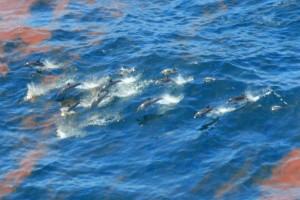After the Deepwater Horizon oil spill in April, teams of biologists from NOAA and other federal and state agencies traveled to the Gulf of Mexico. Their mission was to assess the impacts from the spill to important natural resources including marine mammals such as manatees, dolphins and whales. There are 21 species of marine mammals in the Gulf, and all of them are protected under the Marine Mammal Protection Act. Six of them, all whales, are considered to be endangered under the Endangered Species Act.
NOAA was concerned that these animals might come into contact with the oil, either by swimming through the oil and dispersants, ingesting it, or inhaling it at the surface. These exposures can cause a variety of health impacts in marine mammals, including death. As part of a Natural Resource Damage Assessment, NOAA and other trustees worked to assess the impacts of the spill on marine mammals. We have collected tissue samples and conducted numerous aerial surveys. These help us to assess the abundance and distribution of these animals, as well as whether any of them had been exposed to oil or died as a result of the spill. Sperm whales, Bryde's whales and some types of dolphins live in the deep oceanic waters off of the continental shelf. Their habitats were also exposed to oil and dispersants.
To determine whether they were affected by the spill, twelve Sperm whales were tagged, and their movements were tracked with satellite tags. Scientific research cruises and studies were also conducted to collect information about effects from the spill on the whales and their prey. Some bottlenose dolphins, which live close to the shore, were found oiled. Scientists collected samples and conducted necropsies and autopsies on animals to understand what role the oil played in some dolphin deaths and strandings.
Scientists also worked on small boats, taking photos of the dolphins. They identified them by the unique shape of their fins, and took tissue samples to see if the dolphins had ingested oil from the BP spill and if they were suffering any adverse health impacts. This information will be used by the NRDA teams to assess impacts that may have occurred and to develop restoration plans for these marine mammals and their habitat.
Want to learn more?
- View the Trustee Council's strategic restoration framework for marine mammals (PDF, 66 pg)
- See what the Open Ocean Restoration Area Trustees have been up to lately.
- View our webisode on Dolphin Identification, featuring NOAA Administrator Dr. Jane Lubchenco.


